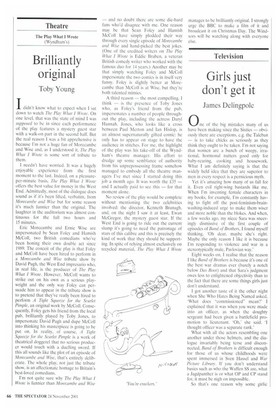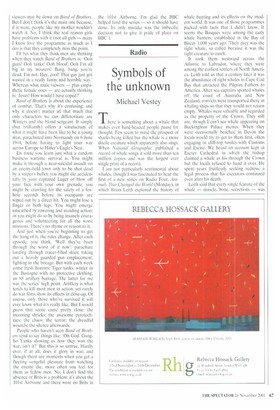Girls just don't get it
James Delingpole
0 ne of the big mistakes many of us have been making since the Sixties — obviously there are exceptions, e.g. the Taleban — is to take chicks as seriously as they think they ought to be taken. I'm not saying that women are a bunch of weepy, irrational, hormonal nutters good only for baby-rearing, cooking and housework. What I am definitely saying is that the widely held idea that they are superior to men in every respect is a pernicious myth.
Yet it's amazing how many of us fall for it. Even evil right-wing bastards like me. When I'm inventing female characters in my books, for example, I'm constantly having to fight off the post-feminism-brainwashing-induced urge to make them wiser and more noble than the blokes. And when, a few weeks ago, my niece Sara was sneeringly dismissive of the first couple of episodes of Band of Brothers, I found myself thinking, 'Oh dear, maybe she's right. Maybe the only reason I like it is because I'm responding to violence and war in a stereotypically male, Pavlovian way.'
Eight weeks on, I realise that the reason I like Band of Brothers is because it's one of the best war dramas ever (barely a notch below Das Boot) and that Sara's judgment owes less to enlightened objectivity than to the fact that there are some things girls just don't understand.
I got another taste of it the other night when She Who Hates Being Named asked, 'What does "commissioned" mean?' I explained that it was when you were made into an officer, as when the doughty sergeant had been given a battlefield promotion to lieutenant. 'Oh,' she said. 'I thought officer was a separate rank.'
What with all the actors resembling one another under those helmets, and the dialogue invariably being terse and disconnected, Band of Brothers is difficult enough for those of us whose childhoods were spent immersed in Sven Hassel and War Picture Library. If you don't understand basics such as who the Waffen SS are, what a Jagdpanther is or what OP and CP stand for, it must be nigh on impossible.
So that's one reason why some girlie
viewers may be down on Band of Brothers. But I don't think it's the main one because, if it were, people like my mother wouldn't watch it. No, I think the real reason girls have problems with it (not all girls — many I know love the programme as much as I do) is that they completely miss the point.
bet what they think men are thinking when they watch Band of Brothers is: 'Ooh guns! Ooh tanks! Ooh blood! Ooh Fm all big in my trousers! Bang, bang, you're dead. I'm not. Hey, cool! That guy just got wasted in a really funny and horrible way,' Whereas what male viewers — plus empathetic female ones — are actually thinking is: 'Jesus! How would I have coped?'
Band of Brothers is about the experience of combat. That's why it's confusing; and why it doesn't matter all that much that only characters we can differentiate are Winters and the blond sergeant. It simply (but brilliantly) offers a simulacrum of what it might have been like to be a young man, parachuted into Normandy on 6 June 1944, before having to fight your way across Europe to Hitler's Eagle's Nest.
En route you learn just what a random business wartime survival is. You might make it through a near-suicidal assault on an enemy-held town only to be shot dead by a sniper's bullet; you might die accidentally by your captured Luger or blow off your face with your own grenade; you might be crawling for the safety of a foxhole seconds before its occupants are wiped out by a direct hit. You might lose a finger or both legs. You might emerge unscathed by cowering and avoiding action; or you might do so by being insanely courageous and volunteering for all the worst missions. There's no rhyme or reason to it.
And just when you're beginning to get the hang of it, the rules change. After each episode, you think, Well they've been through the worst of it now': parachute landing through tracer-filled skies; taking out a heavily guarded gun emplacement; fighting in the bocage. But with each week come fresh horrors: Tiger tanks; winter in the Bastogne with no protective clothing; an 88 artillery barrage. The latter for me was the series' high point. Artillery is what tends to kill most men in action, yet rarely do war films show its effects in close-up. Of course, only those who've survived it will ever know what it's really like. But I would guess that scene came pretty close: the incoming shrieks; the awesome pyrotechnics; the chaos; the terror; the dreadful wounds; the silence afterwards.
People who haven't seen Band of Brothers tend to say things like: 'Oh God. Gungho Yanks showing us how they won the war, isn't it?' But this is so untrue. Hardly ever, if at all, does it glory in war; and though there are moments when you get a fleeting vengeful pleasure from watching the enemy die, more often you feel for them as fellow men. No, I don't find the absence of Brits is a problem: it's about the 101st Airborne and there were no Brits in the 101st Airborne. I'm glad the BBC helped fund the series — so it should have done. Its only mistake was the imbecilic decision not to give it pride of place on BBC I.



















































































 Previous page
Previous page